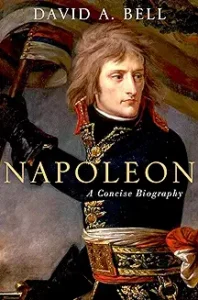Napoleon: A Concise Biography by David A. Bell 2015
Everywhere one goes in Paris, one is confronted with the fact that history is alive and well in France. From the Fourth of September Metro stop to the statues of Place de Republique with their dates of battles, from the Invalides where Napoleon’s body is buried to the column in Place Vendome made from Russian cannons captured in battle, French history is everywhere.
So it seemed appropriate to read a history of Napoleon while here, and since recent biographies have run to multiple volumes and thousands of pages, I chose Bell’s concise history. In his introduction the author states his goal to present “an accurate and reliable portrait of Napoleon that incorporates the results of recent research but is also concise and accessible to those without special knowledge”. He has succeeded
Napoleon was a most incredible character, larger than life. Born to a Corsican family of modest means in 1769 (Corsica was at that time a part of France but had he been born a year earlier, he would have been Genoan!), he was educated at private school in France and spent one year at the Ecole Miliataire in Paris at the time of the French Revolution. Through a combination of luck, timing, and genius-like strategic military and self-promoting public relations skills, he rose quickly to become a general at the age of 27. His military triumphs in Italy and then Egypt brought him glory and fame, and he returned to France to stage a coup that overthrew the First Republic. He was named Consul and then eventually Emperor in 1804. In both instances, plebiscites approved his elevation.
The next 10 years were a non-stop series of wars with Great Britain, Austria, Germany, Russia, and eventually, even Portugal and Spain. War had changed from the engagement of formally marshalled professional troops into huge battles where thousands died and entire nations warred on each other, and Napoleon was brilliant at exploiting those tactics. Paris is full of streets and boulevards named for his famous victories, but the enmity of Great Britain with its superior naval forces would prove to be his undoing when combined with the disastrous attempt to take Moscow in which over 600,000 soldiers and enormous materiel were lost.
Defeated on the battlefield and unpopular at home, Napoleon was ousted as Emperor in 1814 and exiled to Elba. In a spectacular attempt at a comeback, he launched the Hundred Days returning to Paris, reassuming his title of Emperor, and leading the army in a final attempt to defeat the British and their allies. Wellington’s victory at Waterloo ended Napoleon’s reign, and the victorious British removed him to St. Helena, an island in the middle of the South Atlantic where he died in 1819.
His legacy in France and all of Europe remains controversial. His Napoleonic code, his translation of the Revolution’s ‘egalite’ into legislation, his emphasis on education, and the long European peace designed at the Congress of Vienna after his defeats continue to have a positive presence. On the other hand, the red tape of the French bureaucracy and its administrative strangling of initiative and innovation are a part of his legacy as well.
A fascinating man and a well-done book.



